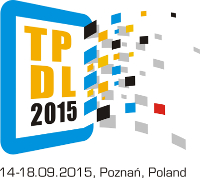Third International Workshop on
Digital Scientific Communication (WDSC):
Reuse, Sharing, and Assessment
of All Research Products
Friday, 18th of September 2015
Special Theme
Although not mandatory, this year’s edition will also include a special focus on the “publishing of scientific experiments”, i.e. any scientific products intended to convey and describe the scientific process (i.e. experiment) in such a way it can be “repeated” by others. Examples of “experiments” are therefore executable objects (e.g. software, virtual machines, services, workflows), narrative objects (e.g. structured e-notebooks, textual descriptions in an article), or combinations of these (e.g. research objects, enhanced publications). To date, no research community has agreed on common scientific communication workflows for experiments and all known activities in this direction are of investigative or testing character. Known initiatives are myexperiment.org, the executable papers grand challenge, and those relative to electronic experimental notes. The problem has the same discipline-specific character encountered when dealing with research data, but faces the more complex questions of “what is an experiment”, “how can I hand it over”, “how can I set the conditions for repeating the experiments”, etc. Depending on the technology, devices, laboratories, facilities involved, these may find different answers, even within the same research community. For example an experiment could be represented by an accurate textual description of a methodology, an executable computer workflow, a piece of software, a virtual machine with all applications and data, or by combinations of such products.
- Identification, representation, description (metadata), deposition, preservation, evaluation, and interoperability for experiments
- Enabling repetition (“same experiment, same laboratory”), replication (“same experiment, different laboratory”), reproduction (“same experiment, different input parameters”), or re-use of experiments (“use as parts of other experiments”)
- Interlinking (and contextualizing) with other products of science, e.g. datasets, articles.
- Research datasets, articles, and other product of research conceived to support experiment “publishing”, e.g. executable papers, electronic notebooks, software journals, Elsevier’s “article of the future”, software publishing, datasets embedding services.
23.04.2015
Workshop WebSite Online 